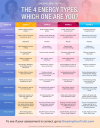Yes I've done tons of these personality tests. Humans like to categorize things, it's a natural thing for us and likely helped our ancestors survive (see a furry thing? Quick categorize it, is it more like the bear that ate Ogg last week, or like the deer we had for dinner yesterday?). I think all of them I've done provided a tiny amount of insight and were more like parlor games than serious tools for interpersonal relationships. Especially being in management for some reason they think if we know that someone is red/blue but with a yellow reaction space it will completely change the 5 minutes interaction I'm having with that person. Yeah, no, none of it sticks like that.
The only one I've found to be worth anything is a kind of hippy dippy new age one that my wife found and was all the rage in church where we lived oh I don't know, maybe 10 years ago. It's called Energy Types by Carol Tuttle, which she actually put out there as Dress your Truth, a guide to fashion based on your energy type, which I found silly. But my wife loved the energy type idea and had all of us take it, so with the kids too. It's one of the few things like this I've found that actually had an impact on how we interacted with each other. I found myself using it at work in my communication with people and it changed the way we interacted with our kids too, all for the good.
Here are the basic categories. And we look at it as what motivates each type and what is their basic driver. And to really simplify it's basically Type 1 - creative, fun and excitement, Type 2 - relationships and comfort, Type 3 - drive and getting things done and 4 - analytical and here's how we can do it better. But in this I've had more impact on my management style and even parenting and it has helped my relationship with my wife. Mainly because with a few cues to watch for you can pretty accurately guess someone's type at least close enough to color how you interact to a point. So for the type, everyone has some of all of them of course, but you generally have a primary mode and a secondary. Mine is generally 4/1 and my wife is 2/3 and once we understood that, it helped us get past some things each of us struggled with in the other person, and to have more patience for the downsides of those types. Like I'm just not a git'r'done kind of person, I want it to be fun. My wife is more of a "you can play after we get our stuff done" kind of person. We both struggled with that aspect with each other. But understanding the types like this (those particular ones are 1 - fun and 3 - task completion, which can really clash) we can adjust how we interact and react with each other, and I understand what I need to give her, like keeping myself focused on her list on a busy Saturday for example (3's tend to be very list-driven), and vice versa. I could go on and on but really it's been the best one I've seen yet, having done tons of them. It's the one that sticks.
View attachment 14997

